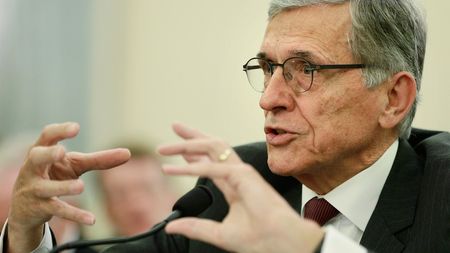Tom Wheeler to Hill: 1 Gig Needed to Bridge Digital Chasm
Former FCC chairman said that must be goal of government subsidies

The smarter way to stay on top of the multichannel video marketplace. Sign up below.
You are now subscribed
Your newsletter sign-up was successful
Former FCC chairman Tom Wheeler has has told Congress what he thinks the definition of lack of broadband access should be, a definition he argues Congress should use for handing out $100 billion-plus in broadband subsidies, subsidies that should make symmetrical (the same upload and download speeds) 1 gigabit (Gbps) service a priority.
That is according to his testimony for a hearing Monday (March 22) in the House Energy & Commerce Committee on the LIFT Act, the Democrats' proposed massive infrastructure bill.
Wheeler says that COVID-19 has identified the "adverse effects" from the "absence" of broadband that is "adequate" or "too expensive," an absence he said translates to a digital "chasm."
He suggests service adequate to the task should be 1 gig and will require an ongoing subsidy along the lines of the $50 per month in the one-time Emergency Broadband Benefit program. "Before long, it will be necessary to remove 'emergency' and institute an ongoing program with a long-term funding mechanism," he says.
"Too often the existing federal broadband programs have subsidized what can only be characterized as the network of yesterday," he told the committee. "Not only should such funds build an up-to-date network, but also a network that is futureproofed from becoming inadequate in a few years."
Also Read: FCC Approves $3.2B Emergency Broadband Benefit Framework
In his testimony he pointed to news stories about the difficulty of rural Americans working from home, the lack of reliable Wi-Fi for schools and how "America's terrible internet is making quarantine worse," echoing attacks he made on ISPs during his chairmanship as the snakes in the virtuous internet garden of edge providers.
The smarter way to stay on top of the multichannel video marketplace. Sign up below.
Wheeler said that broadband high-cost subsidies have failed to deliver on the goal of universal access in part because they focused on the companies rather than the technology or the people who needed service.
Wheeler recognizes and applauds that, according to NCTA-the Internet & Television Association, 1 gig service is available to 80% of the county, but said if that is the case "any infrastructure plan should prioritize a pathway to such level of service for all Americans," as the LIFT Act does.
And he says that means prioritizing a fiber first policy, since he says wireless is unlikely to be able to provide wireless gigabit. "Wireless may be a last resort option in the most isolated areas, but it should not be a first resort for most of America," he said.
The broadband portion of the LIFT Act includes totals $109.3 billion, comprising $80 billion for 100% broadband deployment, plus $15 billion for next gen 911 services, $5 billion for low-interest federal loans for broadband deployment, and $9.3 billion in subsidies for "affordability" and education to make sure "everyone can afford internet service and have the knowledge and tools to use the internet in ways that meet their needs."
The FCC would be authorized to award $60 billion of that in a competitive bidding process, with the other one-fourth going to states for their own competitive bidding process.
The broadband portion also would mandate that the FCC adopt rules to collect price and network resiliency data from ISPs and incentivize those ISPs to disclose price and terms of service and it would require the FCC to come up with rules to allow E-rate to be used to fund Wi-Fi service on school buses.
Contributing editor John Eggerton has been an editor and/or writer on media regulation, legislation and policy for over four decades, including covering the FCC, FTC, Congress, the major media trade associations, and the federal courts. In addition to Multichannel News and Broadcasting + Cable, his work has appeared in Radio World, TV Technology, TV Fax, This Week in Consumer Electronics, Variety and the Encyclopedia Britannica.

